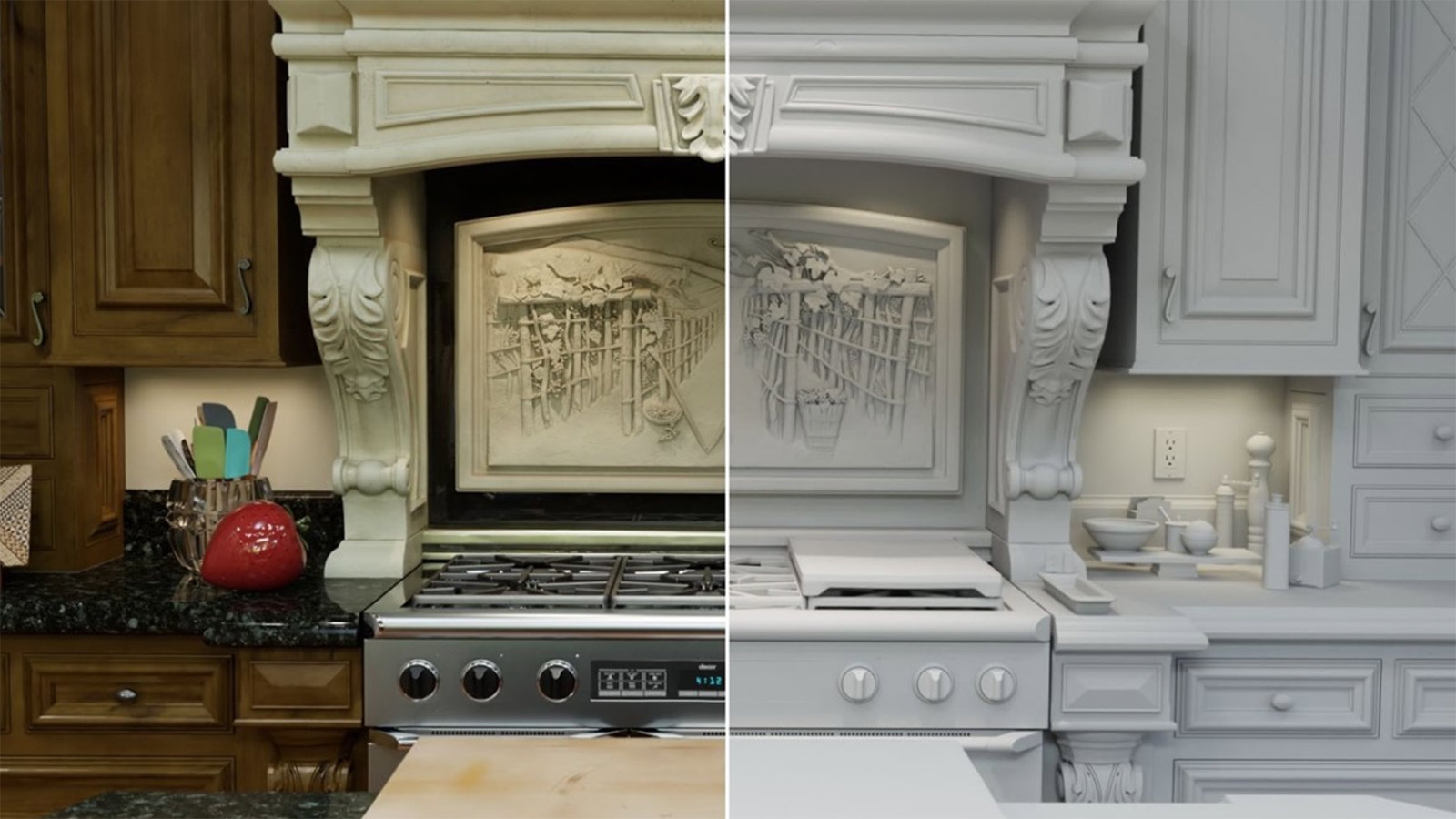Jensen's Kitchen was a lie: Nvidia reveals GTC 2021 keynote nearly 100% fake
Nvidia rendered CEO and his kitchen using Nvidia Omniverse

Sign up for breaking news, reviews, opinion, top tech deals, and more.
You are now subscribed
Your newsletter sign-up was successful
*Update: Nvidia reached out to TechRadar to note that while Jensen's corporeal form may have been rendered during portions of the keynote, it was Jensen Huang himself who was speaking:
"Through all but 14 seconds of the hour and 48 minute presentation — from 1:02:41 to 1:02:55 — Huang himself spoke in the keynote," the company's blog post now reads.*
Nothing is real and anything is possible – Nvidia CEO Jensen Huang's iconic kitchen, where he presented three pandemic-era keynote addresses in 2020 and 2021 – was almost entirely fake, including Huang himself, during the company's GTC 2021 keynote earlier this year and nobody even noticed.
The virtual presentation was cooked up using something called Nvidia Omniverse, a multidisciplinary collaboration tool for creating 3D virtual workspaces. For an annual keynote address known for impressive technical displays, this one certainly delivered.
Most viewers had no idea they hadn't seen the real Huang speaking from his real kitchen until a new documentary by Nvidia was released that detailed the efforts that went into making that presentation.
A video of Nvidia's DGX Station A100 workstation was also entirely generated using Omniverse.
- Take a look at these best mobile workstations
- Here are some of the best programming laptops
- And here are the best laptops for editing videos
The news comes as a shock to just about everyone in the industry, given that the virtual presentation in April 2021 raised no suspicions among the tens of thousands of industry professionals and press who covered the event. Nvidia's Omniverse was that good at recreating what has become a very familiar scene.
Sign up for breaking news, reviews, opinion, top tech deals, and more.
Just at the computer graphics conference SIGGRAPH 2021, Nvidia revealed through a documentary that April’s press conference was a “fake” one. In the screen, Jensen Huang’s kitchen, his leather clothes, even his expressions, movements, hair... are all synthetic#NVIDIA #SIGGRAPH pic.twitter.com/fyrb8wgCYaAugust 12, 2021
In a blog post on Wednesday, Nvidia talked about the experience of recreating a space for which tech enthusiasts have developed a real attachment. "Jensen's kitchen" was a pandemic staple for PC hardware fans who were used to watching or even attending much larger, more heavily produced launches.
"The demo is the epitome of what GTC represents: It combined the work of NVIDIA’s deep learning and graphics research teams with several engineering teams and the company’s incredible in-house creative team," the company said.
"To create a virtual Jensen, teams did a full face and body scan to create a 3D model, then trained an AI to mimic his gestures and expressions and applied some AI magic to make his clone realistic.
"Digital Jensen was then brought into a replica of his kitchen that was deconstructed to reveal the holodeck within Omniverse, surprising the audience and making them question how much of the keynote was real, or rendered."
Jensen's kitchen, meanwhile, brings its own understated charm to Nvidia's recent keynotes. There's nothing quite like seeing Huang pull the brand new RTX 3090 out of his oven during the Nvidia Ampere reveal last year, and for many people dealing with lockdowns and social distancing due to the pandemic, the keynotes were a way to digitally connect with fellow enthusiasts in the comments section of the livestream.
It was a natural choice then to make Jensen's Kitchen the demonstration of Nvidia's Omniverse tool, which is all about creating realistic 3D workspaces where people can meet and collaborate. Cool as it is, though, we still prefer the real thing.
- AMD vs Nvidia: who makes the best graphics cards?

John (He/Him) is the Components Editor here at TechRadar and he is also a programmer, gamer, activist, and Brooklyn College alum currently living in Brooklyn, NY.
Named by the CTA as a CES 2020 Media Trailblazer for his science and technology reporting, John specializes in all areas of computer science, including industry news, hardware reviews, PC gaming, as well as general science writing and the social impact of the tech industry.
You can find him online on Bluesky @johnloeffler.bsky.social